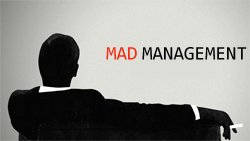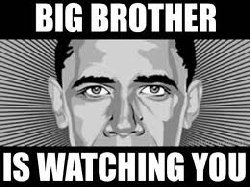(Click for
AUDIO VERSION)
To use this segment in a Radio broadcast or Podcast, click HERE.
 "A policy is written to protect a company from those who break the rules, not from those who follow them." - Bryce's Law
"A policy is written to protect a company from those who break the rules, not from those who follow them." - Bryce's Law
In today's litigious society, a Policy Manual (sometimes referred to as an Employee Handbook) is a wise investment for any company, large or small. Let me give you an example, back when we were developing products for mainframe computers, our staff blossomed to 25 employees, a small company no matter how you look at it. Like any startup company, our interests in the early days were on product development, marketing, and servicing our customers. As our company grew, we began to take on additional consultants, developers and clerical personnel. We then began to notice people taking advantage of our work environment, e.g., sick days, excessive doctor visits, people began to dress sloppily, they were spending too much time attending to personal affairs at the office, etc. It finally became obvious we needed a well written policy manual to bring conformity to our operations and protect the company from abuse. We thereby devised a formal Policy Manual, and had all of our employees read it and sign a statement they understood its contents.
Policy Manuals may be common practice in large corporations but it is also a shrewd investment for small companies. I am still amazed that a small business such as ours needed to develop a Policy Manual but I am certainly glad we implemented it for it has saved us on more than one occasion from frivolous lawsuits brought on by former employees.
Understand this, a policy is written to protect a company from those who break the rules, not from those who follow them. In our early days, when there were just a handful of employees, it was easy to monitor what everyone was doing and communicate our corporate position to them, but as the company grew, it added a new level of complexity to our communications making it harder to assure consistency in the conformance of our rules. An employer would like to believe its employees will maintain the best interests of the company. Regrettably, this is a naive concept as employees normally put their own personal interests before the company's. If it was true, there would not be a need for a Policy Manual. A Policy Manual, therefore, is needed for those people who break the rules; for those who do not, it is a trivial concern.
WHAT SHOULD A POLICY MANUAL CONTAIN?
The manual should provide tightly worded descriptions of corporate positions. The following is a sampling of sections that should be included. Additional sections may be required due to the nature of your business.
Introduction:
* Introductory comments from a senior officer (e.g., President) specifying the purpose and organization of the manual.
* Code of Employer-Employee Relations - specifying the basic rights of both the employee and the employer.
* Optional - organization charts, business function charts, a definition of the corporate culture.
Employment:
* Equal Employment Opportunity
* Sexual Harassment
* Hiring
* Employment Agreement
* Orientation and Training
* Medical Procedures
* Probation
* Transfer
* Promotion
* Hours of Work
* Reporting of Time and adherance to defined methodologies.
* Temporary and Part-time Employees
* Termination of Employment
* Retirement
* Safety
Pay Practices:
* Salary Administration
* Performance Appraisals
* Bonuses and Pension
* Severance Pay
Reimbursement of Employee Expenses
* Travel
* Automobile Usage/Vehicle Care
* Customer Entertainment
* Meal Reimbursement
* Expense Account Guidelines
* Participation in Trade and Professional Associations
Employee Benefits:
* Vacations
* Holidays
* Lunch
* Health Services
Company Premises and Work Areas:
* Maintenance of Work Area
* Personal Property
* Solicitation
* Parking
* Security
Absence from Work:
* Attendance and Punctuality
* Short-term Absences
* Leaves of Absence
Personal Conduct:
* Behavior of Employee
* Personal Appearance of Employees
* Personal Finances of Employees
* Customer Relations
* Vendor Relations
* Personal Telephone Calls, Mail, and use of Internet (incl. E-Mail)
* Conflicts of Interest
* Confidential Nature of Company Affairs
* Intellectual Property
* Disciplinary Affairs
* Drugs and Narcotics
* Smoking
Miscellaneous:
* Maintenance of Personnel Records
* Updates (Log)
* Forms
It is not uncommon to structure the policies in accordance with a numbering scheme somewhat similar to a financial chart of accounts. Further, the Policy Manual should be prefaced with a Table of Contents which reference the section numbers. An index is also helpful.
When writing policies, keep the language simple, clear, and to the point. Your objective is to write policies in such a way as they may not be misinterpreted or leave anything to someone's imagination. After policies have been written, they should be carefully reviewed by management and modified accordingly.
It is important to recognize that the policy manual is a legal document and ultimately represents a contract with your employees. As such, it should be reviewed by your corporate attorney.
IMPLEMENTATION
Policy Manuals are normally printed and bound and distributed to managers to review with employees. It is not unusual for companies not to allow such manuals off of corporate premises. Further, manuals are often numbered and assigned to individuals. The reasons for this are twofold: to control the whereabouts of the manuals and to assure employees have reviewed it.
Regardless of how the manuals are distributed, it is important to obtain a signed statement from each employee that they have reviewed and understood the policies contained in the manual. This statement should then be filed in the employee's employment jacket for maintenance. In the event of modifications or additions to the policy manual, updates should be issued and employees acknowledge they have read it as well.
Although companies will typically print Policy Manuals, there is a movement underfoot whereby the Policy Manual is made available to employees via a secure corporate intranet. In this instance, there should be concern over unauthorized printing and distribution of the policies.
CONCLUSION
If you are going to the trouble of writing a Policy Manual, make sure that it is effectively implemented and enforced. There is little point in enacting legislation if you are not going to enforce it.
I have always found the necessity of a Policy Manual to be interesting. There are those employees who can conceptualize, take initiative, and lead moral and ethical lives. But there are also those who need to be told what to do. It is for this latter group that Policy Manuals were devised, not the former.
So, if you are a small company, should you develop a Policy Manual? If you find your employees require structure in their lives or if there is a possibility the company might be sued by an employee, the answer, sadly, is Yes. I cannot imagine operating a company in today's litigious world without one.
Keep the Faith!
Note: All trademarks both marked and unmarked belong to their respective companies.
 Tim Bryce is a writer and the Managing Director of M&JB Investment Company (M&JB) of Palm Harbor, Florida and has over 30 years of experience in the management consulting field. He can be reached at timb001@phmainstreet.com
Tim Bryce is a writer and the Managing Director of M&JB Investment Company (M&JB) of Palm Harbor, Florida and has over 30 years of experience in the management consulting field. He can be reached at timb001@phmainstreet.com
For Tim's columns, see:
timbryce.com
Like the article? TELL A FRIEND.
Copyright © 2012 by Tim Bryce. All rights reserved.
 As high as American corporate tax rates have been over the years we could always count on the Japanese to post higher rates thereby making us look not too bad. Unfortunately, this all changed recently when Japan announced they were dropping their rates leaving America alone at the top with the highest tax rates in the world. Actually, most corporate tax rates in other countries have been retreating over the last ten years in order to attract talent to their shores and promote existing businesses. To illustrate, consider how the "Combined Corporate Tax Rates" have changed over the last decade in these key countries:
As high as American corporate tax rates have been over the years we could always count on the Japanese to post higher rates thereby making us look not too bad. Unfortunately, this all changed recently when Japan announced they were dropping their rates leaving America alone at the top with the highest tax rates in the world. Actually, most corporate tax rates in other countries have been retreating over the last ten years in order to attract talent to their shores and promote existing businesses. To illustrate, consider how the "Combined Corporate Tax Rates" have changed over the last decade in these key countries:
 Tim Bryce is a writer and the Managing Director of M&JB Investment Company (M&JB) of Palm Harbor, Florida and has over 30 years of experience in the management consulting field. He can be reached at timb001@phmainstreet.com
Tim Bryce is a writer and the Managing Director of M&JB Investment Company (M&JB) of Palm Harbor, Florida and has over 30 years of experience in the management consulting field. He can be reached at timb001@phmainstreet.com I have been using a variety of computer word processors over the last thirty years and produced some rather fine looking documents using them, but for some reason I still miss the typewriter. Maybe it's because you can quickly type up an impressive looking envelope or fill out a form; Yes, many organizations still use paper forms, particularly nonprofits. The look and feel of a business letter seems somehow more impressive when prepared on a typewriter, more professional and authoritative if you will.
I have been using a variety of computer word processors over the last thirty years and produced some rather fine looking documents using them, but for some reason I still miss the typewriter. Maybe it's because you can quickly type up an impressive looking envelope or fill out a form; Yes, many organizations still use paper forms, particularly nonprofits. The look and feel of a business letter seems somehow more impressive when prepared on a typewriter, more professional and authoritative if you will.
 The premise behind Hitchcock's 1935 movie classic, "The 39 Steps," was not about a staircase, but rather a series of clandestine tasks to ultimately overthrow the government. It was an intriguing movie but as it turns out, it actually takes considerably fewer steps to subvert a government, four to be exact, at least according to Yuri Bezmenov, a former KGB agent. Throughout the 1960's, Bezmenov served the KGB primarily in India where he spread Soviet propaganda and disinformation to the Western world. He eventually defected to the West in 1970 and settled in Canada where he lectured and wrote about the KGB's techniques for subverting the West.
The premise behind Hitchcock's 1935 movie classic, "The 39 Steps," was not about a staircase, but rather a series of clandestine tasks to ultimately overthrow the government. It was an intriguing movie but as it turns out, it actually takes considerably fewer steps to subvert a government, four to be exact, at least according to Yuri Bezmenov, a former KGB agent. Throughout the 1960's, Bezmenov served the KGB primarily in India where he spread Soviet propaganda and disinformation to the Western world. He eventually defected to the West in 1970 and settled in Canada where he lectured and wrote about the KGB's techniques for subverting the West.
 "A policy is written to protect a company from those who break the rules, not from those who follow them." - Bryce's Law
"A policy is written to protect a company from those who break the rules, not from those who follow them." - Bryce's Law Regardless of your political inclination, there now exists a perception the main street media is not to be trusted as a source of valid news, that its integrity is kaput. Instead, news outlets are viewed more as a tool for political activism. In September 2011, the Gallup organization reported, "The majority of Americans still do not have confidence in the mass media to report the news fully, accurately, and fairly."
Regardless of your political inclination, there now exists a perception the main street media is not to be trusted as a source of valid news, that its integrity is kaput. Instead, news outlets are viewed more as a tool for political activism. In September 2011, the Gallup organization reported, "The majority of Americans still do not have confidence in the mass media to report the news fully, accurately, and fairly." The
The  One of the reasons AMC's
One of the reasons AMC's  A few odd stories have surfaced in the news recently which caught my attention, all involving the feeding of the homeless. Evidently there is a movement underway by local governments to curb donations of food supplies to soup kitchens. At first I dismissed it as an obscure story, but when I saw it recur in different places including New York, Philadelphia, Dallas, Nashville, and elsewhere, I knew something was underfoot.
A few odd stories have surfaced in the news recently which caught my attention, all involving the feeding of the homeless. Evidently there is a movement underway by local governments to curb donations of food supplies to soup kitchens. At first I dismissed it as an obscure story, but when I saw it recur in different places including New York, Philadelphia, Dallas, Nashville, and elsewhere, I knew something was underfoot. Recently I came across a local news story having to do with road rage. Evidently, two men in their twenties got into a highway dispute in the wee hours of a morning which led to a physical confrontation whereby one man finally pulled out a gun to defend himself and killed the other person. The shooter has not been charged with a crime as he is protected by Florida's "Stand Your Ground" law. This resulted in a firestorm of letters commenting on the story, most criticizing the shooter and claiming the victim was a really nice guy. Interestingly, most of the people springing to the defense of the victim appeared to be of the same age (in their twenties). Those who came to the defense of the shooter appeared to be older. This led to a rather toxic debate on the Internet with the two sides arguing which person was at fault in the incident. So much so, I got the uneasy feeling the issue started to become as ugly as the initial confrontation, maybe more so.
Recently I came across a local news story having to do with road rage. Evidently, two men in their twenties got into a highway dispute in the wee hours of a morning which led to a physical confrontation whereby one man finally pulled out a gun to defend himself and killed the other person. The shooter has not been charged with a crime as he is protected by Florida's "Stand Your Ground" law. This resulted in a firestorm of letters commenting on the story, most criticizing the shooter and claiming the victim was a really nice guy. Interestingly, most of the people springing to the defense of the victim appeared to be of the same age (in their twenties). Those who came to the defense of the shooter appeared to be older. This led to a rather toxic debate on the Internet with the two sides arguing which person was at fault in the incident. So much so, I got the uneasy feeling the issue started to become as ugly as the initial confrontation, maybe more so. An interesting technology that is gaining momentum among consumers is Radio-Frequency IDentification (RFID), and it is something we all better start paying attention to. Actually, RFID is an old concept allegedly resulting from our military and espionage efforts in WW2. It involves the miniaturization of radio transmitters to send signals for a variety of purposes; e.g., does anybody remember the transmitter James Bond hid in the heel of his shoe in the movie "Goldfinger"? RFID has come a long way since then, and has been reduced to a tiny computer chip about the size of a grain of rice. This of course means it can go just about anywhere and opens some interesting possibilities for commercial use. It is now implanted in animals to identify them, in highway toll collection devices, in passports and company identification cards thereby allowing security access to facilities. Consumers though need to pay particular attention to how RFID is being implanted in credit/debit cards, for this conceivably opens Pandora's Box to identity and financial theft.
An interesting technology that is gaining momentum among consumers is Radio-Frequency IDentification (RFID), and it is something we all better start paying attention to. Actually, RFID is an old concept allegedly resulting from our military and espionage efforts in WW2. It involves the miniaturization of radio transmitters to send signals for a variety of purposes; e.g., does anybody remember the transmitter James Bond hid in the heel of his shoe in the movie "Goldfinger"? RFID has come a long way since then, and has been reduced to a tiny computer chip about the size of a grain of rice. This of course means it can go just about anywhere and opens some interesting possibilities for commercial use. It is now implanted in animals to identify them, in highway toll collection devices, in passports and company identification cards thereby allowing security access to facilities. Consumers though need to pay particular attention to how RFID is being implanted in credit/debit cards, for this conceivably opens Pandora's Box to identity and financial theft.
 The concept of Data Mining involves harvesting data, organizing it, and using it for such things as trend analysis. Historically, it is a technique used by companies in the absence of a managed data base environment whereby companies resigned themselves to simply pouring through huge volumes of data to arrive at some conclusions. More recently it has come to represent a technique for gathering data external to a company which is particularly useful for evaluating the likes and dislikes of consumers thereby providing the means to court their favor.
The concept of Data Mining involves harvesting data, organizing it, and using it for such things as trend analysis. Historically, it is a technique used by companies in the absence of a managed data base environment whereby companies resigned themselves to simply pouring through huge volumes of data to arrive at some conclusions. More recently it has come to represent a technique for gathering data external to a company which is particularly useful for evaluating the likes and dislikes of consumers thereby providing the means to court their favor. In just about any job interview, managers look at applicants for such things as skills and proficiencies, intelligence level, their ability to listen and learn, and a variety of other attributes. One aspect they are particularly interested in is the intuitiveness of the person which is difficult to quantify and substantiate. Just about all managers hope the new worker possesses this important "sixth sense" which helps to spot problems before they occur and take corrective action. One of the best icons for intuitiveness was Corporal Radar O'Reilly of M.A.S.H. fame, who would process paperwork and take care of the camp's business before the Colonel could issue the orders. As efficient as Radar was, he was the exception as opposed to the rule in the camp. The same is true in business.
In just about any job interview, managers look at applicants for such things as skills and proficiencies, intelligence level, their ability to listen and learn, and a variety of other attributes. One aspect they are particularly interested in is the intuitiveness of the person which is difficult to quantify and substantiate. Just about all managers hope the new worker possesses this important "sixth sense" which helps to spot problems before they occur and take corrective action. One of the best icons for intuitiveness was Corporal Radar O'Reilly of M.A.S.H. fame, who would process paperwork and take care of the camp's business before the Colonel could issue the orders. As efficient as Radar was, he was the exception as opposed to the rule in the camp. The same is true in business.